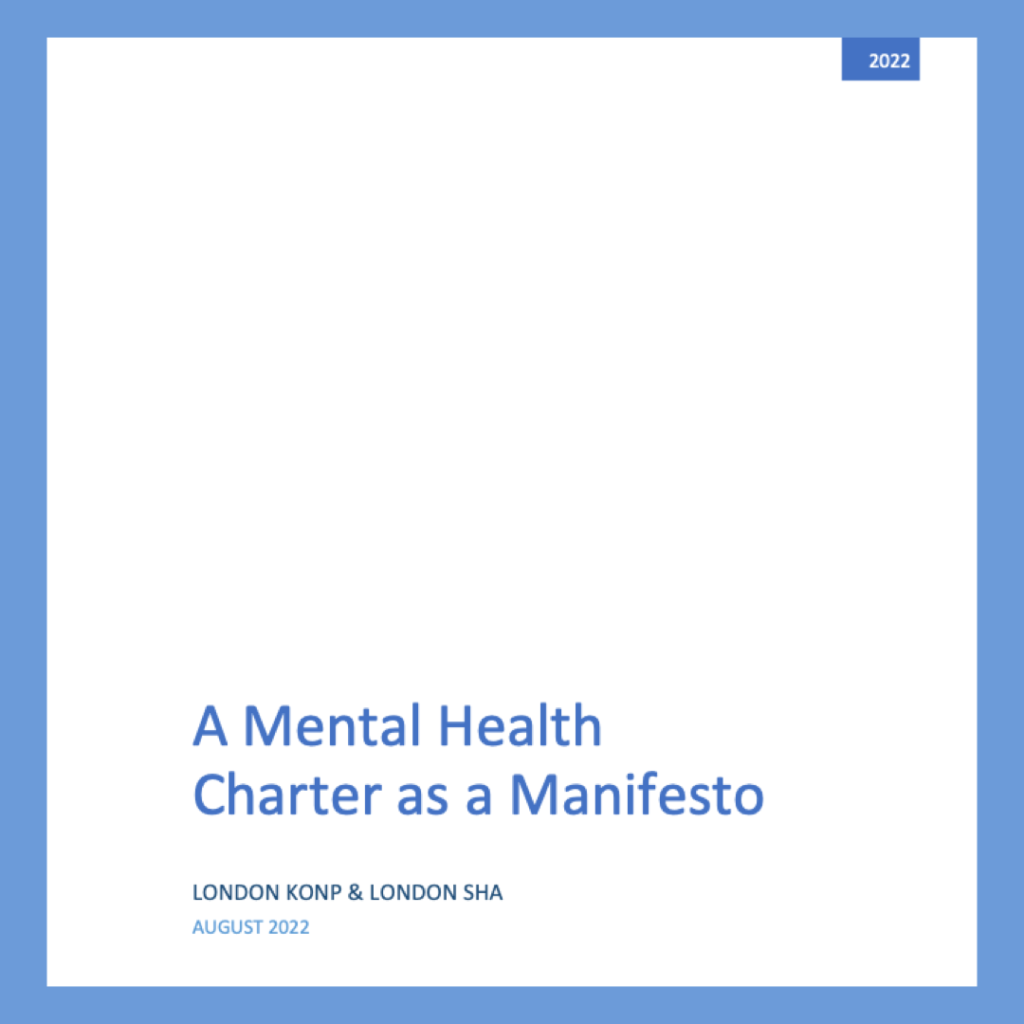
Who Are the Mental Health Working Group?
The Mental Health Group began as a London-based Keep Our NHS Public group in early 2021. Later that year, the group was approached by the Mental Health sub-group of the Socialist Health Association’s London branch and the two groups decided to collaborate. Many members of the MHG are in both organisations.
We now have over 40 members from different parts of the country – Liverpool, Newcastle, Sheffield, Barnsley. We have become a national group. Our members are current and retired healthcare workers; service users, their family members and carers; community workers; NHS campaigners. Many of us have been involved in mental health politics and campaigning for many years.
We regularly invite speakers to talk to the group about their experience in the mental health field for part of our meetings.
Join the group
The group meets on the first Tuesday of the month at 6.30-8.00pm.
We welcome new members from all areas of the UK. Any member of KONP or SHA is qualified to join us. Please contact Paul Atkinson at [email protected]
The Common Good video series
Members of the group have helped create a YouTube channel on the politics of mental health The Common Good – and to date have posted four episodes. Watch episode below The Mental Health Crisis or view all episodes here
What campaigns are we involved in?
Across the group, we are involved in a number of arenas of mental health campaigning for which the group provides a forum of support, discussion and inspiration. One or more members of the group are involved in campaigning on the issues listed below. If you would like to join us in campaigning around any of these areas, please contact Paul Atkinson at [email protected]
Mental Health Manifesto
One of our first projects has been the drawing up of a Mental Health Manifesto, an attempt to lay out an understanding of the political context as well as the current realities of mental health services in the UK. To quote the manifesto’s preamble: “It is not aimed at a particular audience but exists, we hope, as a potential resource for anyone interested in understanding not just but ‘who and how’ but also the ‘why’ any us with a mental health problem may feel ostracised and receive a poor service.”
Adult Inpatient Bed Closures
Members of Hammersmith and Fulham Save Our NHS and Ealing Save Our NHS (both affiliates of KONP) are doing work on proposed permanent adult inpatient bed closures at the two trusts in NW London – in Ealing and at the Gordon Hospital in Westminster.
They have also been pressing strongly, for some time, for the development and publication of a NW London-wide strategy for mental health provision, covering ALL mental health provision – and open for public engagement – so that the adequacy of provision and the effects of partial cuts and closures can be seen in a strategic context.
Long-term Prescription of Antipsychotic Drugs
The impact on people of long-term prescription of ‘antipsychotic’ drugs, often including long periods of polypharmacy, for 20+ years. Anecdotally, families report loss of ‘the person they knew’, personality change, sedation/energy loss, loss of memory (especially short-term memory), early onset dementia, Parkinsonian type symptoms. It is generally acknowledged that life span is reduced by about 25 years. “I hope to gather information from families and professionals, and to confirm (or not) with those collating such long term data officially, how commonly they occur. What is done to help people with such disturbing symptoms?”
Prisons and Mental Health
Prisons are a current way of dealing with long term mental health problems. In some gaols, it has been reported that 70 – 90% of prisoners have diagnosable mental health problems. Other than specialist hospitals like Ashworth, Broadmoor and Rampton, prisons are not hospitals; they have inadequate staff numbers, with no professionals capable of supporting these people let alone helping rehabilitate them.
Crisis care at the Maudsley Hospital
Developing crisis care at the Maudsley Hospital, exploring how to develop improved mental health services in SE London based on the Trieste approach.
Digitalisation, AI and the use of data
The entry of digitalisation and the use of data and AI in mental health care. If the policy of ‘sustainable’ healthcare through the use of tech continues to make inroads, what will our future mental healthcare be? Other sectors have already been ‘disrupted’ by Big Tech – data, algorithms and digital innovation. Through intellectual monopolies and costings, healthcare data is increasingly ‘controlled’ by corporations.
If the money is spent in this way for healthcare what will be left of human interaction? Will chatbots and behavioural programming be for the poorer classes, while those with wealth pay for human relational therapies? Why would private psychiatric hospitals want to keep their customers away? Will state funded psychiatric hospitals and staffed places of safety disappear as beds are cut, and those without money have to take their chances in the community with mental health digital/ virtual care- after all suicide is not illegal, some in government may almost see it as a lifestyle choice?
The Failure of NHS Talking Therapies
Group members in NE London and Bristol (Bristol Protect our NHS – a KONP affiliate) are campaigning to expose the ineffectiveness and inefficiencies of NHS Talking Therapies in NE London, and the decimation of longer term, more relational counselling and psychotherapy services from mainstream NHS primary and secondary provision. Two thirds of NHS referrals to talking therapies drop out each year. A two-tier system of psychotherapy and counselling has been established – short-term CBT via the NHS and relational therapy for the well off.
Refugee Mental Health
Refugee health has always been problematic and especially mental health. But in times of austerity it increases not least because of the invisibility caused by stigma. “Our work is to publicise the needs of refugees & asylum seekers. Asylum seekers are those we target as they are the most in need and their goal is to become a refugee. A goal only one step higher than being an asylum seeker, but incredibly tortuous to reach.”
Crisis services
The lack of facilities to respond to mental health crisis in London. What are the best ways to support and provide care for people experiencing acute crisis through alternatives to inpatient admission?
Mapping the privatisation of mental health services
Some work in London has already been started to try to do this. An initial impression is that the market for private clinics for wealthy, stressed Londoners is burgeoning, while residential care for people with severe, enduring mental illness and dementias is being forced into the suburbs where property is cheaper and profits can be assured. The private hospitals continue to take the overflow of patients from under-funded state services. Private community care services may become available for those who can afford it. We need to document this more fully and compare with other cities and rural areas.
The Barnsley Mental Health Forum
The work of the Barnsley Mental Health Forum, a service user led group formed in 2017: “We worked alongside services, staff and commissioners and were invited, in lockdown, to join online MH Strategic meetings. Now we contribute regularly in MH service planning and commissioning, influencing local MH services, and undertaking a Service User Review of the new local MH Strategy this winter. Also we are working with Healthwatch and service staff to develop an Accountability Group to hold MH Decision-makers and Engagement Teams to account for the effectiveness of decisions and the service-user involvement in them.”
Newsreel
We will be developing an ongoing diary of monthly news on mental health issues and campaigning from the media and other sources. Watch this space for the link.

